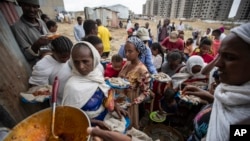A high-level pledging conference in Geneva co-sponsored by Ethiopia, Britain and the United Nations received $610 million in pledges to provide lifesaving humanitarian assistance for millions of Ethiopians suffering from the ill effects of conflict and climate change. It was seeking $1 billion.
“We understand this is just the beginning, and we hope for continued and increased support throughout the year,” said Joyce Msuya, U.N. assistant secretary-general for humanitarian affairs.
Of the 20 countries, the U.S. was the biggest donor with $154 million, followed by the United Kingdom with $124.58 million and the European Union with $139 million.
Last month’s U.N.-backed multibillion-dollar humanitarian response plan is less than 5% funded, far from enough to address the dire needs of 15.5 million people suffering from conflict and back-to-back climate shocks.
Ambassador Shiferaw Teklemariam, commissioner of the Ethiopian Disaster Risk Management Commission, told journalists in Geneva on Tuesday that he hoped the pledging event would turn things around and donor nations would provide critical lifesaving support to Ethiopia. Failure to do so, he said, would have serious consequences.
“We are coming out of the COVID pandemic. And, at the same time several disasters including epidemics, locusts, displacements, as we have already raised, is an issue which we have to address and that is why we are saying we really have to act before it is too late,” he said.
The United Nations warns the emergency has been building up through cycles of droughts, floods and conflict and is likely to peak during the July-September lean season.
The U.N. projects nearly 11 million people are likely to be food insecure, causing malnutrition levels to rise during the lean season, the period between harvests when food stocks are at their lowest.
Andrew Mitchell, Britain’s deputy foreign secretary and minister for Development and Africa who recently visited Ethiopia, said he saw increasingly worrying signs of famine-like conditions emerging in conflict areas in the north.
“What we found when we went up into Tigray and looked at the areas, where the marginalization and the difficulties were taking place. We found an increasing number of people, particularly children suffering from malnutrition, with the pipeline growing,” he said.
“Because of climate change and particularly because of the displacement of people, we saw that the coping mechanisms of people were being seriously eroded and people were selling whatever they had,” he added.
El Nino has exacerbated a drought in the northern highlands. U.N. agencies report malnutrition rates in conflict-ridden parts of Afar, Amhara, and Tigray are worsening, forcing millions of people to cope with less water, drier pastures and smaller harvests.
Ramiz Alakbarov, U.N. assistant secretary-general, resident and humanitarian coordinator in Ethiopia, noted that the compounded effect of back-to-back climate shocks and conflicts “is quite devastating.”
“On top of it, we have 4.5 million people who have left their homes,” he said, noting that Ethiopia “is among the top 10 countries with the highest level of internal displacement caused by all those elements.”
At the same time, he said “conflicts have destroyed and damaged thousands of schools, health facilities, water systems and other community infrastructure in a number of regions and that adds to the difficulty.”
Alakbarov said the U.N. was working with the Ethiopian government and international partners to strengthen national systems and civil society. He said humanitarian aid is focused on helping the most vulnerable people, which is a major challenge.
“The challenges are working on improving the access, which is not fluid. Sometimes we are prevented in reaching people and people cannot reach us because of insecurity. … In many parts of Ethiopia that situation needs to improve,” he said.
Conference organizers say Ethiopia will need at least $1 billion to cover critical aid needs for the next three months.
Last year, USAID and the U.N.’s World Food Program temporarily suspended food aid to Ethiopia amid allegations that the food was being diverted. The Ethiopian government denied this.
The agencies have since resumed food distributions following stringent reforms to prevent anything similar from occurring.
“In December, after a six-month pause prompted by the discovery of widespread aid diversion, USAID resumed food assistance in Ethiopia,” Isobel Coleman, USAID deputy administrator told the conference.
“We worked closely with the Ethiopian government and our partners, including the U.N., to reform the food aid system and protect against corruption,” she said.
“Since December, we have reached more than 4 million people with food assistance across the country, prioritizing drought- and conflict-affected regions with the most acute need,” said Coleman, noting that the U.S. is providing Ethiopia with an additional $154 million contribution, bringing its total aid to $243 million this year.
Alakbarov described the reform system as “one of the most detailed and most verified processes I have ever observed in my life.”
“That includes 30 verification points including issuance of digital IDs, creation of community complaint mechanisms and all sorts of digital tracking of every bag of items,” he said.
“The problem is that we do not have enough to distribute,” he said.




